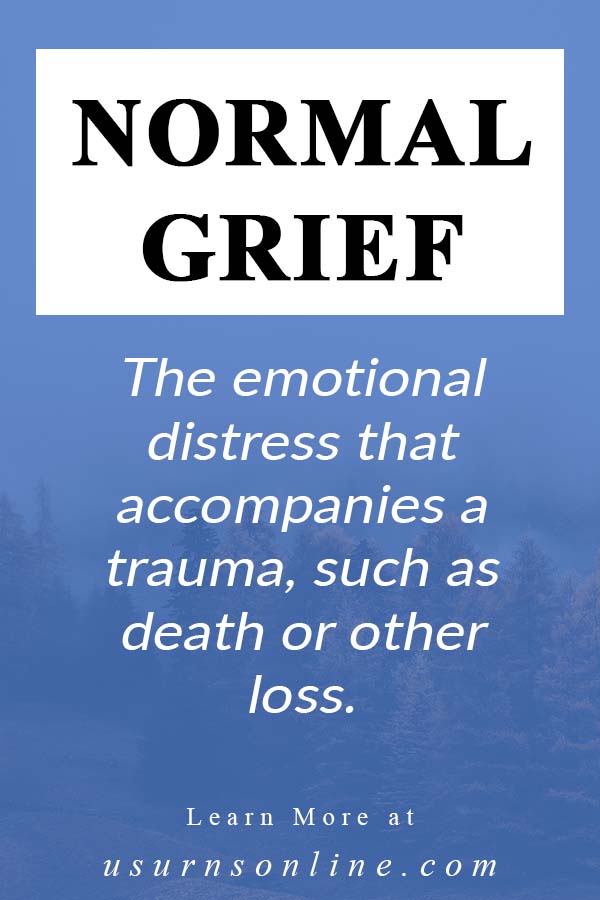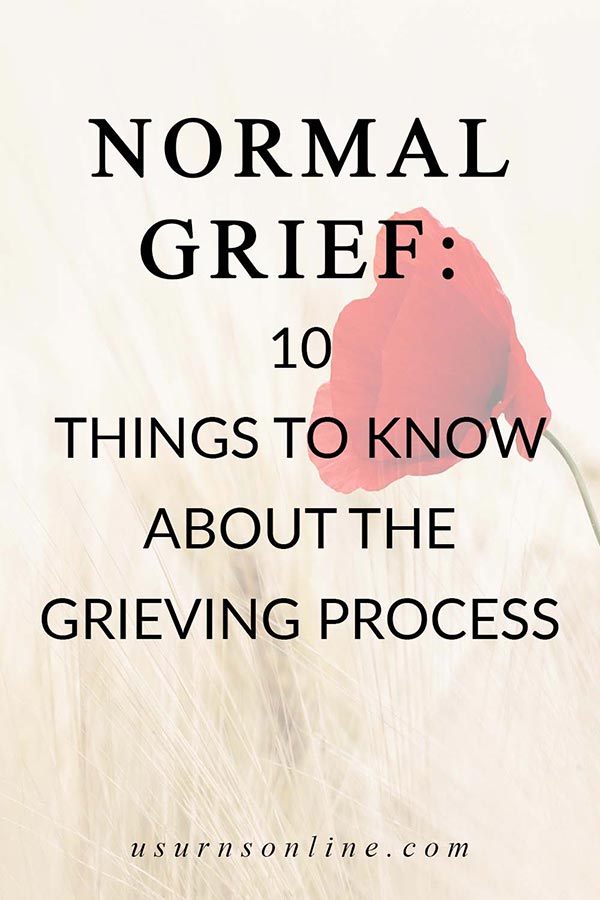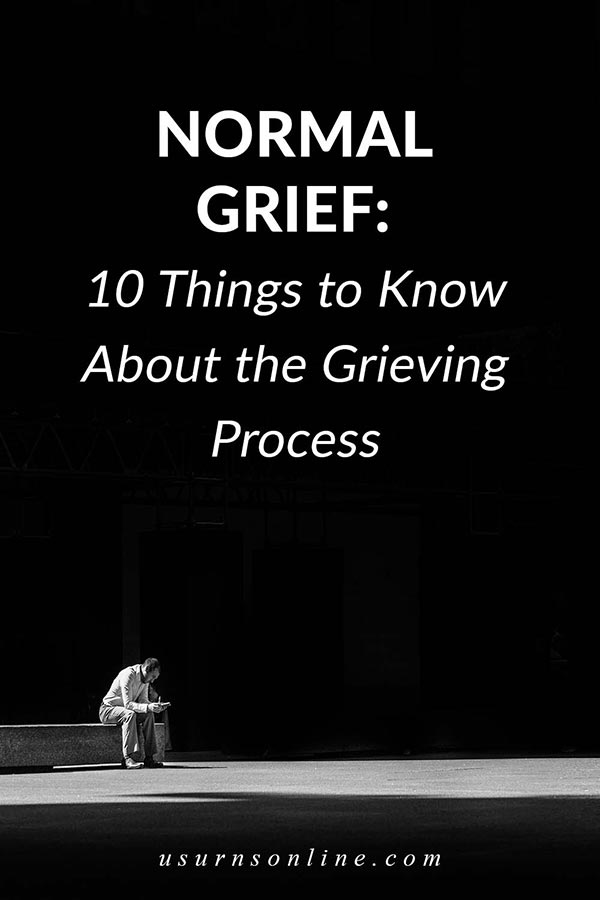“Normal” grief? Yes, grief is normal. And we are all bound to deal with grief in our lives.
Whether you are in the grieving process, or helping a friend or loved one cope with grief, here is a bit of information that may be beneficial.
What is Normal Grief?
Grief is the “normal,” natural human response to tragedy, trauma, or pain. Normal grief is simply a way to separate the typical process of grieving from other types of grief.
When we hear “grief,” most people think of sorrow and mourning over a death. But someone dying isn’t the only way we experience grief.
You may be going through the loss of a job, a divorce, a physical ailment, a disappointment in life. All of these (any many others) can cause grief to some extent. Still, a loved one dying is probably the deepest grief you will ever have to suffer and work through.

What is the Typical Grieving Process?
There are five widely recognized stages to the grieving process.
- Denial
- Anger
- Bargaining
- Depression
- Acceptance
The process (stages) may not manifest in this order. For instance, you may feel depression before you feel anything else. You will want to keep in mind that just because you have gone through the phase once, it doesn’t mean you won’t visit it again.
Some people go through all five stages, others don’t experience one or more of those stages, and still others feel an even wider range of strong emotions. Professionals note that there can be as many as twelve stages, repetitions of two or three stages, or some other combination.
What’s the Difference Between Normal Grief and Complicated Grief?
The “normal” grief that people feel upon the loss of something or someone will start to abate after a few weeks or months. You will have tears and hurt. Perhaps anger and depression may also result, but you will work your way through this stage of life.
Complicated grief is deeper and more profound than normal grief. If you are feeling this sort of grief, it could lead to angry outbursts, deep depression, even suicidal thoughts or a complete disengagement from life.
Urns Made in the USA
It is extremely important to know where you are in the grieving process so that you may take the proper precautions if you are suffering from complicated grief.
What’s the Difference Between Normal Grief and Depression?
Working through normal grief may leave you feeling depressed. That is a natural feeling.
Are you feeling grief, depression or both? Read on to find out the similarities and differences.
Similarities between grief and depression:
- Acute heartache
- Anxiety
- Weight loss for no apparent reason (You are not trying to lose weight.)
- Body aches
- Appetite Loss
Differences (usually felt with depression, but not typically with grief):
- Suicidal thoughts and reflections
- Feelings of worthlessness
- Inability to experience any joy
- Incapable of performing your day to day activities (showering, getting kids off to school, making meals, and more)
- Feelings of sadness and guilt not related to the loss of your loved one
10 Things You Should Know About Normal Grief
Read on to familiarize yourself with a few things you should know about coping and overcoming your grief.
1. Grieving is normal.
You are not alone in this experience. There are many grief support groups out there. These support groups are a safe place to share what is going on in your life.
You may want to take advantage of a local church or synagogue that is sponsoring a group. Hit up Google for some local help, whether it is a grief counselor, licensed therapist, or support group.
2. You can liken grief to a job.
Grief is hard work and, as you know, hard work pays off. You can work through your grief and come out strong and positive!
3. You will not grieve the same as someone else.
We all grieve differently and in our own unique way. That’s ok… the important thing is, you must allow yourself to grieve. This is the healing time for your body and soul.
4. Grieving is not just about death.
In our lives, grief comes in many forms. We may grieve the loss of a friendship, a divorce, the loss of a dream (like that new house you couldn’t get a mortgage for). You also may grieve the loss of a beloved pet. This is all very normal and your feelings are valid.
5. The loss of your loved one may bring on “secondary” grief.
When the death of a loved one leads – directly or indirectly – to another stressful or traumatic experience, this, too, can result in grief.
Secondary grief could be the loss of financial stability, becoming a single parent, grieving over the experience of your children who just lost a parent, the loss of social status, the loss of friends who aren’t there for you in this difficult time, and the list can go on.
6. Your grieving process can be erratic.
Just when you think you’ve worked through a stage, something may trigger you to take a couple of steps backward. Don’t panic over it. You will be able to work through it and quicker than before.
7. Family and friends may think you are taking too long to recover from your grief.
Let me assure you, there is no set timeframe for grief. Remember that this is “your” grief and you are coping with it on your own timeframe. Telling your family this may help them to understand where you are in the process.
Often, family and friends are most concerned with your recovery; they may not understand that the journey is important, too.
8. Involving your family and friends will help you in working out your grief.
Family and friends are often your greatest support in this time. Allow them to walk alongside you as you mourn your loved one.
Include your children in this grieving and healing process. Children need to grieve too and will grieve differently than an adult.
If you’re reading this to support a friend, here are 22 Tips on How to Help Someone Who Is Grieving
9. Certain friends and family members may find it hard or uncomfortable to be around you since your loss.
There are times when people feel that they may not have the right words. They may not know how to act. You can let them know that a hug can be just as effective as any words of comfort.
10. Grief will change you.
To put it bluntly, don’t expect to ever be that same person you were before this event. Your life has changed and so will you. Recovering and working through the stages of grief is important. Just keep working and pushing through it.
What Are the Other Types of Grief?
Unfortunately, grief comes in all shapes and sizes. Eventually, we will all be pushed through that doorway and have to face grief for ourselves. It is a scary thought indeed.
Keep in mind that grief is a process and you can and will work through it. Don’t be too hard on yourself. Give yourself time and self love.
Learn more about other types of grief here.
How Can I Help?
No matter what type of grief the mourner experiences, they need solid and loving support. Here are 10 specific ways to help a grieving friend or family member.
Pin It





